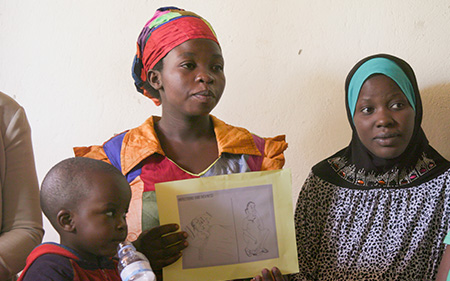My passion for global health was strong, but my direction was vague when I first arrived at UCSF. During years of traveling abroad for medical mission trips, I witnessed endless tragedies caused by limited access to health care and the detrimental effects of poverty on one’s health. Mothers sold the medications they received from my team in order to feed their families; children suffered illnesses that could have been averted with proper and timely care. Their stories underscored the importance of reaching out to medically underserved communities across the globe and elucidated for me that working in global health is how I want to contribute to the world. However, I did not know exactly where to start or how to make positive and sustainable impacts in the Global South.
As I studied in the Master of Science in Global Health program at UCSF, my vision for global health became much clearer. Inspiring classes, professors and guest speakers broadened and deepened my understanding of global health and gave me an even stronger sense of purpose. I learned the importance of practicing cultural humility; I learned about health-related issues that affect so many more people in the world than I realized; and I had a series of revelations that global health is not only about providing medical services, but also about performing cost-effectiveness analyses for health interventions, implementing health policies and so much more.

After seven months of intellectually and conceptually preparing to work in the field of global health, it was time to apply what I had learned in class to the real world—the capstone research project. I had an incredible opportunity to work with UCSF’s Preterm Birth Initiative (PTBi) East Africa team to perform a secondary data analysis of antenatal care utilization among pregnant women in Migori County, Kenya. I must say, my capstone project taught me more than how to do data cleaning and run the R statistical program: it demonstrated what it is like to work in the field of global health and what is actually going on behind the scenes of global health research.
When I reviewed my dataset for the very first time, my heart sank for a brief moment. I was frightened by blanks and discrepancies in the dataset because I had expected it to be “perfect” just like datasets that I had seen in class and textbooks, with no missing information or inconsistencies. My mentor soon told me not to worry, this was a common experience.
From this experience, I had the profound realization that one has to be flexible and creative in the field of global health. Not every data collection, data analysis, or project will go exactly as planned and expected. There always will be obstacles and issues that no one can foresee, especially in low- and middle-income countries that undergo political, economic and social changes. I learned that it is crucial for global health practitioners to be adaptable and find innovative ways of solving problems and moving their project forward.
Among numerous lessons that I learned from my capstone experience, the most valuable was that no one can do global health work alone. What captivated me the most about the PTBi East Africa team was that, while each member of the team strove to carry out specific roles and responsibilities, the whole team listened to, helped and encouraged each other. I realized that global health improvements cannot be achieved without partnership and teamwork—both within a research team and between the Global South and Global North.
Global health works just like a gear, I thought, because in order to create a positive force, not only must each cog and its teeth be functional, but multiple cogs must fit into each other and work together.
Now that my capstone research period is over, I feel that it was such a privilege to work with the PTBi East Africa team and have this remarkable experience. With all the lessons and skills that I gained from my project, I sincerely hope to reach out a helping hand to those who are in desperate need of care and to make viable changes to improve the health of the underserved around the world.